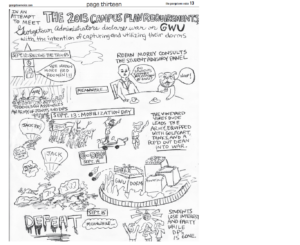In his State of the Union address this past Tuesday, President Barack Obama laid down a set of nearly progressive marching orders. On issue after issue, the president asked for simple action, and in doing so, revealed just how indifferent and destructive the Republican controlled House has been. Yet at the same time, Obama’s speech skirted the very issues that could come to mar his legacy.
In several instances, the president appeared to adopt stances for the simple purpose of appearing bipartisan, always to his own detriment. When discussing the economy, Obama paid far too much lip service to trimming the deficit, an issue that should be secondary when millions of Americans remain out of work, borrowing costs remain at all-time lows, and the economy is stuck in a liquidity trap.
Regarding climate change, the president was forceful in declaring that the time for denial is over. His promise to turn to executive action in the face of Congress’s inaction was important, and hopefully lays the groundwork for emissions regulation by the Environmental Protection Agency. But almost in the same line he promised to speed up the issuance of permits for oil and natural gas drilling, a step that will only increase our nation’s reliance on fossil fuels. And when talking about the need for immigration reform, he suggested that English proficiency would be a requirement for citizenship—an unnecessary and misguided requirement in a country without an official language.
The weakest and most disheartening part of the president’s speech came when he touched on his administration’s unchecked use of drone strikes. Obama refused to use the word “drone,” instead employing the euphemism “range of capabilities” to refer to a program that has potentially killed thousands of innocents. The president promised to make his efforts more transparent to the American people, but there is little indication that that was more than just an empty promise, especially considering his continuous refusal to publicly present the legal framework for the assassination of American citizens.
Still, for all the speech’s weaknesses, there are increasing indications that Obama recognizes the value of a progressive agenda. His call for universal early childhood education puts the spotlight on an issue that receives far too little attention. The lack of preschool education among the nation’s poor is one of the great structural inequalities that prevents every American from having a fair shot at prosperity. His declaration that no American should work full time and remain below the poverty line is a powerful assertion for social justice, even though his plan to raise the minimum wage will not do enough to truly move families out of poverty. Most impressive was his treatment of gun control. His simple but powerful statement that the nation’s victims of gun violence “deserve a vote” stressed just how severely our political system has failed them.
Ultimately, the address raised as many questions as it answered. If the president truly takes a stand on the issues he listed, this State of the Union may well be regarded as his Great Society moment. But, if he succumbs to pressure from a hyper-partisan Congress and a slew of special interests, this speech will go down in history as simply another set of hopeful promises our political system failed to deliver.



